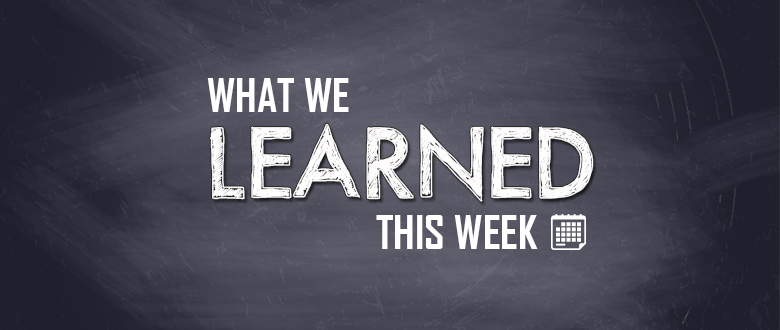WHAT I LEARNED WRITING THIS COLUMN FOR THREE YEARS
LESSON #1: TAKE PEOPLE BEHIND THE CURTAIN— The entire goal of “What We Learned This Week” was to present, distill, translate, and, plenty of times, mock the wacky business side of the film industry. From tracking movie trends, showing off awards buzz, or flat-out following the money, I know I learn new things myself, even as a credential critic, every week about inner-workings of the competitive and petty Hollywood landscape and I hope you have too. I hope you’ve looked past the optics and into the dealings that make these entities and people tick.
LESSON #2: THIS IS A BUSINESS FIRST AND AN ART EXPOSITION SECOND— One of my favorite mantras to say also matches the heart of “What We Learned This Week.” I know it’s not all that nice to admit, but movies are a business first and an art exposition second. It’s been that way since they started selling tickets. Top to bottom, no one is in this industry for free. If they give something away for “free,” there are either strings attached to it or cache that will lead to spent money coming there way eventually. Personally, I’m here for the art, first and foremost. That puts me firmly in the “separate the art and the artist” camp where you’re never going to see me join a cancel culture movement for anyone or any entity. If Neo-Nazis or kitten butcherers make the best picture of the year, I’m going to watch it with open acceptance and consideration. I’m here for the movies, period, but I do the homework connected to this weekly column of following the trends and all those dealings to understand how and why the art is being made. To me, that’s being a discerning consumer as much as a lover of the medium. You can be and do both, and I hope I conveyed that well here in three years.
LESSON #3: CREATIVE BANKRUPTCY IS REAL— In seeing the volume of Hollywood news and trends over the years, I don’t want to report this lesson as true, but it’s really feeling that way, especially in this pandemic year where originality had a chance to shine with all the blockbusters scared away. For every Parasite there is a franchise sequel or remake that beats a dead horse. I get it. That stuff sells better than the risk-taking original stuff, but at some point that bubble is going to burst, if it hasn’t already with the diminishing returns of many franchises. There is always originality out there and buried treasure to find. I will always look further to see it, but I know dozens won’t. I just want to strap those people to a couch and show them something better than the junk they’re always buying.
LESSON #4: FAN SERVICE IS PART OF THE POINT— The hard part about Lesson #3, once again, is that that familiarity works and makes money. That kind of thing has come to be called “fan service” and it’s getting a bad name. In some cases, the cheap namedrops and blatant theatrics rightfully earn those groans and eyerolls. They’re lazy and reek of Lesson #3. There are some times, however, where fan service is precisely the point. If the creators aren’t connecting what is meant to be connected, then they’re doing some of their work wrong. It’s not that I can readily defend “fan service” after years of it, but more that I accept it as par for the course, so to speak. I know it’s coming and I’m over pissing and moaning about it. It makes people happy and it sells tickets, so it’s working.
LESSON #5: TRAILERS ARE HORRIBLE— From the consumer advocacy side of “What We Learned This Week,” I have chosen a few hills to die on and this is one of them. More trailers ruin a future movie experience than help it. I am convinced of that. The joy of complete, unspoiled, and unprimed discovery makes for a better movie experience every damn time compared to that mountain of BS expectations people start building thanks to overhyped and overcooked trailers. I posed a “no trailers” challenge to Feelin’ Film readers, listeners, and followers two years in a row and I hope I swayed a few people to watch less of those damn things. I promise you will like movies MORE.
LESSON #6: “EXPECTATIONS” ARE THE WORST— I will double-down on that matter of “expectations” from Lesson #4 to say this lesson title next. Expectations are not a movie’s fault. They are YOUR fault. Thanks to trailers, click bait social media, advance rumors, and behind-the-scenes scoop stories, you are allowing all of those very manufactured items to steer your tastes further than necessary. We have reached a place where we know too much about a movie before it comes out or, worse, the snark buries something before it even has the chance to try. Secrets are becoming more and more impossible to contain and clickbait feeds too much false news to go with it. Push yourself away from that trough, especially #FilmTwitter. Lower expectations on everything. Detox that junk out of your life, especially Twitter, and let a movie’s riches come to you.
LESSON #7: THE DIFFERENT DEFINITIONS OF “MASTERPIECE”— While we’re talking about hills to die on, I will reflect on what has become my most notorious one. “Masterpiece” was and still is an overused term by critics and fans alike, no matter how you define it, be that something of excellent quality or the single best work of an artist. It’s a word dropped too quickly and too carelessly. Some of that hyperbole for the sake of hyperbole then goes on to fuel some of those warped expectations from Lesson #5. Please do less of that. Reserve the term because it’s supposed to be important. You do that by having some f’n patience. Let a film breathe and age. Let it stand the test of time and build a legacy like a real masterpiece should. I’m going to keep being me and the kind of guy who will wait for an entire career to close before handing out masterpiece feathers. I hope you can too. Throughout my rants on this hill, which have subsided greatly since Dunkirk, if I have gotten any of you reading this to pause and think before using the word “masterpiece,” then that’s a mission accomplished for me. That’s the beginning of the necessary reflection. That’s classic “think before you speak” territory.
LESSON #8: PHYSICAL MEDIA IS UNBEATABLE— Take pride in those shelves at home, folks. The marketplace may be shifting to digital fronts and portability, but there will always be a place for physical media. Just like every vinyl record fan out there will tell you, movies look and sound better where you’re not chasing buffering or peak internet speeds. There will always be a place for physical media for the quality and their educational special features. A good audio commentary can be as spellbinding as the movie itself. You don’t get that watching a movie on your phone with earbuds. On a side note for this Feelin’ Film crowd. Thank you #DammitJacob Neff for making me buy more of it. Keep the wallet-destroying deals coming.
LESSON #9: THEATERS WILL BE FINE— Make no mistake, it’s been long enough in 2020 to finally admit that theaters are in the toilet right now. It’s not looking good and I feel like I have had to cover some type of bad news for movie theaters every week here in “What We Learned This Week” since March. Things may not get better soon or every next year, but theaters are going to be fine. They’re going to come out of this pandemic. There may not be as many. They may be built different or be owned by different entities than before, but they’ll be fine. All of these 2020 blockbusters continue to delay because theaters are still the #1 place to make the most money and also because that’s where movies will always look and sound their absolute best. The theater experience isn’t just a novelty. It’s the original recipe that isn’t going away. They’ve survived wars and recessions before. They’ll survive this one too.
LESSON #10: STREAMING HAS A GREAT DEAL TO OFFER— While you’re waiting for theaters, there is plenty to be consumed in the growing streaming wars happening between media giants. Someday adding all of the possible a la carte platforms may equal an old cable TV bill, but, for now, this is working splendidly. Streaming has become the top place for indie films, classic films, documentaries, and foreigh films to reach their widest possible audiences. Netflix and Disney are becoming the leaders, but Apple and Amazon will continue to grow their services. Watch also for the growing HBO Max footprint and whatever the controlling ownership of Disney does to Hulu. This bubble of collective affordability may burst someday, but it won’t be anytime soon.
LESSON #11: HOW TO BE A BETTER TALKER— Alright, those first nine lessons were the industry/trends stuff in the spirit of the column. I’m going to close with the personal learning experiences and they start here with talk. I want to thank Aaron White and Patrick Hicks for not only giving me this column space but for the opportunities to come on the mic for the Feelin’ Film programs. I bought my first Blue Snowball microphone because of this site and it’s been a boon for my skills. I still talk too fast and stumble plenty, but I’m better than I when I first started out.
LESSON #12: HOW TO BE A BETTER LISTENER— For those that don’t know, by day I’m a school teacher. That’s a profession where a teacher needs to damn near control everything about their classroom for the sake of management and authority. In that way, I can be a bulldog that steamrolls and does all the talking or typing. Hanging around in FF has made me a better listener. That’s another layer of “think before you speak.” It’s not that I’m unaware of divergent opinions. Quite the contrary. I hear them all the time, but seeing where they’re coming from is important. Any and all of us can use some practice in that department.
LESSON #13: HOW TO BE A BETTER CRITIC— Become a better talker and a better listener here in FF among a bunch of other fellow film critics has, without question, improved my professional work as a film critic. While working here, I cracked into Rotten Tomatoes as an approved critic, scoring a bucket list item I didn’t was possible. It is also here where I learned and then often shared that dynamite list of film review cliches from Letterboxd. I have vowed to avoid those tropes and the pull-quote hyperbole that comes from that bush league level of writing, even if that’s unpopular. I’ve gotten feedback that I’ve inspired a few others to do the same or even enter this official fray. In pausing on masterpiece labels, skipping trailers, lowering expectations, and bringing over the educator’s lens that works in a world where everything is evaluated to some degree, I’ve tightened by grading and rating tendences for the better. I have happily championed the prevailing notion that there are legitimate objectives to be found and recognized in all this art. I don’t buy that “art is entirely subjective” cop-out for one second and never will. I have also grown to feel obligated to stand for the best that my role as a film critic can be, especially in a consumer setting that questions their value anymore. That old adage that “anyone is a critic” fills social media and Letterboxd alike with a ton of voices. I have learned to do more, work harder, and aim to be better than the hot take artists. Sometimes that’s going to make me a film snob to some or, worse, just another white male in the groupthink, but I have sharpened myself to be consistent and produce work with integrity, even if it goes against the majority. I seek that with every review I write. I hope you can see that in my work.
LESSON #14: HOW TO STAY A MOVIE FAN— Oddly enough, the hardest part I have found about being a movie critic is trying to stay being a movie fan as well. If you sit back and ask, “Don, how could that happen when you see all the stuff you do.” That answer is good, old-fashioned work-life balance, and that’s another curtain I know I’ve peeled back here in “What We Learned This Week” from time to time. 90% of movies I watch are essentially “for work” as movies where I have a contingent press obligation to provide coverage. Sure, it’s cool that I get to see things early and for free. That access never gets old. But, believe it or not, doing this can become a grind and take up the time commitment equivalent to a second job, and one that doesn’t really pay. Being around the good folks here at Feelin’ Film has reminded me to still be a movie fan. The people in here got me to join Letterboxd and tackle blind spots, lists, and challenges together. They inspire me to make sure I still watch casual movies for fun without the notepad or laptop. Churning out reviews “for work” every week, I can forget to do that and being among fellow fans keeps me inspired.
LESSON #15: THERE IS A DIFFERENCE BETWEEN “FAVORITE” AND “BEST”— The last occupational hazard I’ll speak of here probably also counts as another one of those hills I’m prepared to mount a tombstone on. Like Lesson #2, I echo this lesson sentence often because I’ve reached a point where being a film critic and a movie fan have their limits of being hand-in-hand. Being both isn’t always the same stance or energy. Some of this goes back to subjective vs. objective, but giving five stars to Schindler’s List and five stars to Top Gun are two different things and it can be a challenge of consistency. I hope you can understand, but I HAVE to separate favorites from bests. It’s how I make sense of the world wearing both hats as a critic and aficionado. I like to say “favorites won’t always be the best movies and vice versa, but when something is both, that’s when you have found something special.” That’s my kind of poster or poetry. If you get that, then you get me and I thank you for that.
LESSON #16: GIVE GOOD ADVICE— With each edition of “What We Learned This Week,” I made it a point to always end with recommendations in some shape or form. I’ll save my most personal one for this ending. I may be a writer, critic, teacher, and a movie fan, but I am also a husband and a father above all of that. Calling back to that work-life balance, every night away attending a movie out is a night I miss dinner and bedtime at home. Those are tough choices where I cannot say yes to every event and opportunity. The perks still follow me home. In these last three years, I’ve had my own two children (7 and 6) become true movie watchers who are starting to build their fan interest. I get to open those doors for them and I love it. I’ll be the guy that says, for as much as a good parent should read to their kids, educate them in movies as well. Sit with them. Chat with them after. Engage in those conversations. With my last recommendation, if you’re a new parent now or someday in the future, start the “Mozart Effect” of film scores in the crib, move to silent movies early, or follow this essential list charted by age from Entertainment Weekly. Be purposeful. Don’t just put your kids in front of a movie and leave to get a break. Go ahead and be The Onion article of that dad getting your kids to love uncool and out-of-date media.
 DON SHANAHAN is a Chicago-based and Rotten Tomatoes-approved film critic writing on his website Every Movie Has a Lesson. His movie review work is also published on 25YL (25 Years Later), Horror Obsessive, and also on Medium.com for the MovieTime Guru publication. As an educator by day, Don writes his movie reviews with life lessons in mind, from the serious to the farcical. He is a proud director and one of the founders of the Chicago Independent Film Critics Circle and a member of the nationally-recognized Online Film Critics Society. As a contributor here on Feelin’ Film now for over two years, he’s going to expand those lessons to current movie news and trends while chipping in with guest spots and co-hosting duties, including the previous “Connecting with Classics” podcasts. Find “Every Movie Has a Lesson” on Facebook, Twitter, and Medium to follow his work. (#150)
DON SHANAHAN is a Chicago-based and Rotten Tomatoes-approved film critic writing on his website Every Movie Has a Lesson. His movie review work is also published on 25YL (25 Years Later), Horror Obsessive, and also on Medium.com for the MovieTime Guru publication. As an educator by day, Don writes his movie reviews with life lessons in mind, from the serious to the farcical. He is a proud director and one of the founders of the Chicago Independent Film Critics Circle and a member of the nationally-recognized Online Film Critics Society. As a contributor here on Feelin’ Film now for over two years, he’s going to expand those lessons to current movie news and trends while chipping in with guest spots and co-hosting duties, including the previous “Connecting with Classics” podcasts. Find “Every Movie Has a Lesson” on Facebook, Twitter, and Medium to follow his work. (#150)



